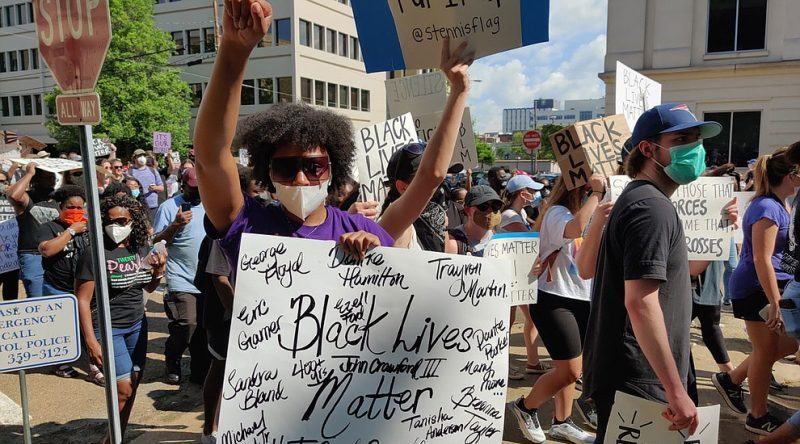OPINION: HOW TO BE AN ANTIRACIST

BLM protest. Photo: Nick Judin/Jackson Free Press

I’ve started reading Ibram X. Kendi’s book, “How to Be an Antiracist,” For Kendi, there’s no such thing as “non-racist.” If an idea or policy creates racial inequities or allows them to continue, then it is racist. If an idea or policy produces or sustains greater equity between racial groups, then it is antiracist.
All Of Us
Kendi has found that antiracist and racist ideas can exist simultaneously in the mind of any person — White, Black, or any other race, including himself. In his words: “The good news is that racist and antiracist are not fixed identities. We can be a racist one minute and an antiracist the next. What we say about race, what we do about race, in each moment, determines what—not who—we are.”
He continues, “Racism is a marriage of racist policies and racist ideas that produces and normalizes racial inequities. … By policy, I mean written and unwritten laws, rules, procedures, processes, regulations, and guidelines that govern people. There is no such thing as a nonracist or race-neutral policy. Every policy in every institution in every community in every nation is producing or sustaining either racial inequity or equity between racial groups.”
Why Are There Inequities And Disproportionalities Between The Races?
According to Kendi, either we see Black people and White people as equal human beings or we don’t. The racist position is that they are not equal; that Blacks are inferior, at least to some extent; and Blacks are to blame, or largely to blame, for the inequities and disproportionalities that we observe. The antiracist position, as Kendi sees it, is that Black people and White people are equal, and every way in which Black people experience disadvantage — lower rates of employment, lower wealth, lower educational achievement, poorer health, lower rates of home ownership, greater incarceration rates, etc. – is the result of racism (racist policies and ideas).
Kendi is quite clear that White people, Black people and people of other races all internalize racist ideas. He even tells a story about a speech he gave in a high school competition, in which he blamed Black youth for not valuing education and limiting their aspirations to sports. He now sees that speech as racist, and argues that “to say something is wrong about a racial group is to say something is inferior about that racial group.” He also shares the view of Black scholar Beverly Daniel Tatum. that racism is like smog in the air — we all breathe it in because it’s the only air there is, and we all — White people and people of color alike — have work to do to get those racist ideas out of us.
The Origins Of Racist Policies
In his extensive research, Kendi found that historically people have instituted racist policies because it made them money, because it got them elected or kept them elected, or because it enabled them to gain status or power. To defend those policies they then use racist ideas and manipulate people’s ignorance and hate. But instituting the policy for their own self-interest came first. They did not produce the racist idea because of their ignorance and hate, as is widely thought. The self-interested policy led to racist ideas, not the other way around.
So the purpose of racism, from the beginning in this country, has always been to enable small numbers of white men to gain wealth, power, and domination. Violence against Black bodies has always been a part of this system because it enabled those whites to stay in control — from the violence of slavery, to the violence of lynching and white riots against Black communities (eg. Tulsa, Rosewood, Elaine (Arkansas)), to the violence of mass incarceration, including throughout, the violence of the police.
If We End Violence Against Black Bodies
Ending that violence, it would not only save Black lives and reduce trauma, but would also free Black people and their allies to go all out for justice in every area – employment, wealth, education, health, etc. That would unleash a liberatory force that would benefit the entire society. Every injustice would be questioned. The power of the 1% to control obscene amounts of wealth and manipulate the political process would be challenged. Their ability to pursue catastrophic climate policies that will harm us all, and disproportionately harm people of color worldwide, would end. Their ability to frustrate the will of the people, who increasingly favor bold action to stop climate change, would end.
When the system in which we live consistently creates and maintains racial inequity, that’s racism. When we fail to challenge the policies that maintain those inequities we are complicit with racism. In the situation we are in, only by challenging the status quo and boldly calling for transformative change can we be antiracist.
Part Of How We Get There
One thing I think needs to be added to Kendi’s approach is the significance of the fact that racist ideas have deep emotional roots in all of us. These ideas were introduced to us early in our lives, and took root in the places where we already felt alone, scared, misunderstood, and powerless. We cannot simply think them away. We need to heal the emotional wounds that they are attached to. We need to be listened to about our individual stories, our fears, the pain of separation and mistreatment, and the hurt and rage we feel about the dehumanizing, and too often lethal, toll racism takes every day on so many people. For more information about healing the effects of racism please see “How to Begin Support Listening Session for Ending Racism.”
Russ Vernon-Jones was the Principal of Fort River Elementary School from 1990-2008. He is a co-facilitator of the Coming Together Anti-Racism Project in the Amherst area. He co-chairs the Racism-Climate Change Connections working group of Climate Action Now of Western Mass, and blogs regularly on climate justice at www.RussVernonJones.org.
